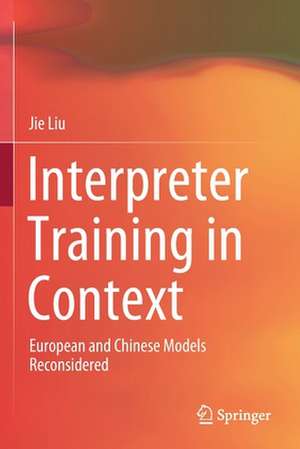Interpreter Training in Context: European and Chinese Models Reconsidered
Autor Jie Liuen Limba Engleză Paperback – 9 oct 2021
This book addresses an important, yet under-researched domain in interpreting education: how theoretical training models should be responsive to context. To do so, it applies the linguistic concept of ‘context’ to interpreting studies by investigating practices in representative (conference) interpreting training programmes in Europe and China. After presenting an overview of interpreter training programmes, the author describes the need to reassess the applicability of the well-established and widely accepted model of interpreting from the Paris School (ESIT/AIIC model) to the Chinese interpreting training scene.
Building on the theoretical study of context in foreign language classrooms suggested by linguists like Halliday and Hasan (1993); Kramsch (1993) and others, the author subsequently constructs a new curriculum, comprising a four-step approach to consecutive interpreting courses in the Chinese context. The rationale for such an approach is justified in accordance with the overall design of context, taking into account the four dimensions in a teaching–learning environment.
This book is intended for scholars and graduate students who are interested in translation and interpreting, applied linguistics as well as foreign language education. It also serves as a practical guide for developing (university-level) translation and interpreting programmes.
| Toate formatele și edițiile | Preț | Express |
|---|---|---|
| Paperback (1) | 690.76 lei 6-8 săpt. | |
| Springer Nature Singapore – 9 oct 2021 | 690.76 lei 6-8 săpt. | |
| Hardback (1) | 696.82 lei 6-8 săpt. | |
| Springer Nature Singapore – 8 oct 2020 | 696.82 lei 6-8 săpt. |
Preț: 690.76 lei
Preț vechi: 812.66 lei
-15% Nou
Puncte Express: 1036
Preț estimativ în valută:
132.18€ • 144.03$ • 111.38£
132.18€ • 144.03$ • 111.38£
Carte tipărită la comandă
Livrare economică 23 aprilie-07 mai
Preluare comenzi: 021 569.72.76
Specificații
ISBN-13: 9789811585968
ISBN-10: 9811585962
Ilustrații: XIII, 155 p. 15 illus., 6 illus. in color.
Dimensiuni: 155 x 235 mm
Greutate: 0.25 kg
Ediția:1st ed. 2020
Editura: Springer Nature Singapore
Colecția Springer
Locul publicării:Singapore, Singapore
ISBN-10: 9811585962
Ilustrații: XIII, 155 p. 15 illus., 6 illus. in color.
Dimensiuni: 155 x 235 mm
Greutate: 0.25 kg
Ediția:1st ed. 2020
Editura: Springer Nature Singapore
Colecția Springer
Locul publicării:Singapore, Singapore
Cuprins
Chapter 1 Introducing Basic Concepts of Interpreting and InterpreterTraining.- Chapter 2 Contemporary Interpreter Training Practices in Europe and China.- Chapter 3 Acquiring Interpreting Competence through Training: European and Chinese Training Models Explored.- Chapter 4 Didactic Approaches to Interpreter Training: Contexts, Approaches and Coping Tactics.- Chapter 5 Optimizing Interpreting Education in the Chinese Context: Principles, Curriculum and Pedagogy.- Chapter 6 Towards a Contextual Model for Interpreter Education.
Recenzii
“Interpreter Training in Context: European and Chinese Models Reconsidered is a worthy addition to an important and highly relevant topic. Given its focus, a key part of the work’s audience will naturally be interpreter trainers working in China and/or with Mandarin Chinese … . the volume successfully blends theoretical and practical aspects in an insightful manner, with the clear potential to play an influential role in interpreter training in the Chinese context.” (Antony Hoyte-West, Studies in Comparative Education, Vol. 43 (1), 2022)
Notă biografică
Jie Liu is currently a Postdoctoral Fellow under the "Postdoctoral International Exchange Program" at Central China Normal University (CCNU) in Wuhan, China. He received his Ph.D. from Utrecht University (2015) and has been a Research Scholar at the University of Florida. Previously, he held an Associate Professorship at the National Huaqiao University, where he also served as Lead Interpreter. His work has been published in several international interpretation and translation journals. Over the past decade or so, Jie Liu has been an active conference interpreter and member of the Translators’ Association of China (TAC), and the European Society of Translation Studies (EST).
Textul de pe ultima copertă
This book addresses an important, yet under-researched domain in interpreting education: how theoretical training models should be responsive to context. To do so, it applies the linguistic concept of ‘context’ to interpreting studies by investigating practices in representative (conference) interpreting training programmes in Europe and China. After presenting an overview of interpreter training programmes, the author describes the need to reassess the applicability of the well-established and widely accepted model of interpreting from the Paris School (ESIT/AIIC model) to the Chinese interpreting training scene.
Building on the theoretical study of context in foreign language classrooms suggested by linguists like Halliday and Hasan (1993); Kramsch (1993) and others, the author subsequently constructs a new curriculum, comprising a four-step approach to consecutive interpreting courses in the Chinese context. The rationale for such an approach is justified in accordance with the overall design of context, taking into account the four dimensions in a teaching–learning environment.
This book is intended for scholars and graduate students who are interested in translation and interpreting, applied linguistics as well as foreign language education. It also serves as a practical guide for developing (university-level) translation and interpreting programmes.
This book is intended for scholars and graduate students who are interested in translation and interpreting, applied linguistics as well as foreign language education. It also serves as a practical guide for developing (university-level) translation and interpreting programmes.
Caracteristici
Provides a panoramic overview of major interpreter education models in Europe and China Includes essential information on key elements in interpreter education—curriculum models, didactics, and educational psychology, especially as regards (non-Western) emerging countries like China Presents a four-step curriculum to help university-level interpreting/translation educators in ‘non-Western’ emerging economies Highlights the importance of ‘context’ in implementing interpreter education models
